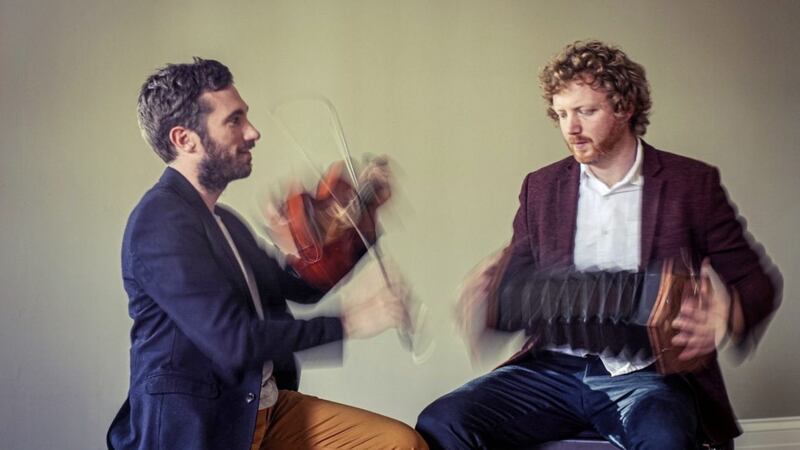IT WAS probably the deepest answer to an opening question I have ever been given.
"Why is it you play music?" I asked concertina player, Cormac Begley.
"I think just to cleanse my demons," he replied. "I play music because I think it’s necessary for me to connect to something deeper within myself and it allows me to express anything I’m feeling or thinking in a meaningful way.
"I think words can only get to a certain point of consciousness. There’s some stuff you’re not even aware of yet that you can’t even put to words. Words can bring you to a certain point but music fills in the gaps and has a broader breadth in expressing stuff you aren’t consciously aware of yet. I find that that sustains me. That’s why I play music."
"Wow! It's not just for the craic then?" was NOT my next question.
Cormac is another of the young musicians who are looking deeper into traditional music, looking for its very essence above and way beyond the foot tapping and the head nodding.
One of the famous Ó Beaglaoioch/Begley dynasty of west Kerry, Cormac learned music by osmosis, with players like Martin Hayes, Johnny O’Leary and musicians from east Clare and west Kerry always being in the house. Like the Hotel California, this could be heaven or this could be hell.
"I remember being asleep then my parents coming home and partying and me banging on the floorboards below me, screaming ‘Shut up!’" he recalls.
After a rebellious period, Cormac finally succumbed to his destiny.
"My addictive personality got hold of the concertina, so I got exploring it, opening it up and learning how it worked," he says.
At university in Galway, the Kerryman studied psychology – which maybe explains his opening answer – so, artfully mixing the two, I ask how music affects the listener and the player.
"It depends on how you look at psychology; there are so many ways and avenues of looking at it," he replies. "I think if you’re playing music and if you can connect honestly to how you’re feeling on a deep level and if you can express that and get that out again that’s when music can have significant impact on people. We’re all form the same family, all human; we all have the same capacity for empathy. Straight away if somebody is on the phone you know how they’re feeling.
"If you’re lonely, for example, and you go to a concert of Tony McMahon, you can feel that in his playing and you’ll think ‘I’m not the only person’. That’s only one level of it. There’s the inspiration level and lots of other layers to it.
"And then there’s just getting people up to dance, getting people excited and the social aspect of it. Getting people out, chatting, community, connection, and just the craic and going mad dancing away at it. There are so many different levels to it," he says.
Cormac is doing an informal review of the etiquette of the session for the Tradconnect website and while sessions are nearly always held in pubs, it was he who set up Tunes in the Church, an idea which grew out of Steve Coulter's concerts for folk music in the church in Dingle from which sprang the idea for Other Voices.
"I kind of felt that, as a musician, the pub setting is only quite recent (70 years or so). I wanted to elevate respect for the music and have an environment in which they can listen to the music, engage with the music by asking questions.
“It’s acoustic, no microphones. Bringing it back to the important environment and giving it the respect that it deserves and making that available to music lovers and to tourists.
"Rather than just having a concert where you have everyone playing music – to give people the opportunity to actually engage, to ask questions of the musicians, about the instruments and the music they play. It makes every night a bit different in that respect.
“I’ve gone to all these touristy things, gatherings for Irish tourism and stuff like that. The majority of people who do come here for the music go to these big over-produced shows, bright lights, short skirts, they rarely get to see what 95 per cent of traditional musicians actually do and why they do it.”
Cormac hadn't been playing solo much until the last few years, preparing for his newly released album, imaginatively entitled Cormac Begley, a collection of tunes that he says struck him on the first hearing.
"They come to me and I want to learn them. I play a range of concertinas; there are some tunes that suit one of those in particular. I wanted to show the possibility of each of those instruments. I’m the only bass instrument player of traditional music other than bass [the instrument] players. I’m also the only baritone concertina player. Piccolo concertina players are few and far between too," he says.
When not playing solo, Cormac plays with his father, Breanndan – he’s very talkative and a very good listener.
Duets? "Love them." Trios? "I’m involved in a trio with Jack Talty and Noel Hill on concertina – that’s another very interesting thing to be doing. Another interesting thing is with American cellist Rushad Eggleston – he’s an amazing musician. And playing with Caoimhín Ó Raghallaigh, my father and Jack Talty, and the band Ré with Liam Ó Maonlaí, Maitiú Ó Casaide, Eithne Ní Chatháin and Peter O’Toole – playing with each of those is a different experience. Playing solo is probably the hardest, but they’re all enjoyable."
Cormac tours with Ré this month and, as well as performing with Caoimhín Ó Raghallaigh in Belfast next month, he'll be teaching workshops too.
"In June, Tunes in the Church – seven nights a week in Galway and Dublin. I won’t be playing but I’ll be organising that. There will be six or seven weeks of courses at AIRT I’ll be teaching at and I’ll be teaching at Willie Clancy, Drumshambo, Feakle... Rushad, the cellist, he’s coming over at the end of August and we’ll be doing a three-week tour in September. I’ll be playing the National Concert Hall in October, then I’m off for three months in my new campervan with my girlfriend around Europe to take a break."
Ha! Take that, you demons.
:: Caoimhín Ó Raghallaigh and Cormac Begley are playing at An Droichead in Belfast on Saturday May 13 at 8pm.




